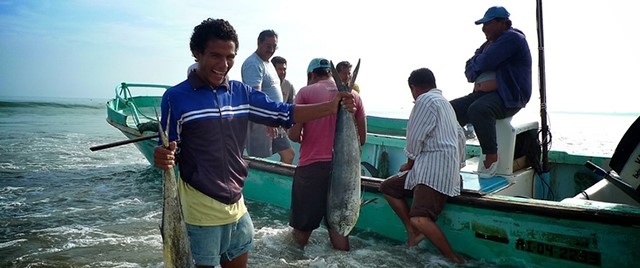FISH4ACP to boost artisanal mahi-mahi fishing in the Dominican Republic
 Santo Domingo, 18 June 2021: FISH4ACP today launched a global initiative to promote sustainable fisheries and aquaculture value chains in the Caribbean island of the Dominican Republic. The Programme will focus on improving mahi-mahi fishing, aiming to ensure that economic growth goes hand-in-hand with environmental sustainability and social inclusiveness.
Santo Domingo, 18 June 2021: FISH4ACP today launched a global initiative to promote sustainable fisheries and aquaculture value chains in the Caribbean island of the Dominican Republic. The Programme will focus on improving mahi-mahi fishing, aiming to ensure that economic growth goes hand-in-hand with environmental sustainability and social inclusiveness.
“Mahi-mahi provides many of our fishermen with an income and is a healthy source of food with a high growth potential,” said Carlos José Then, Director of theDominican Council for Fisheries and Aquaculture (CODOPESCA)at a virtual meeting to mark the start of FISH4ACP in the Dominican Republic. He added: “In seeking to increase economic returns, we need to be mindful of their ecological footprint and make sure that benefits are shared equitably.”
FISH4ACP is a global initiative of theOrganisation of African, Caribbean and Pacific States (OACPS)covering twelve African, Caribbean and Pacific countries.Funded by the European Union (EU) in conjunction with theGerman Federal Ministry for Economic Cooperation and Development (BMZ) the Programme is implemented by the Food and Agriculture Organisation of the United Nations (FAO).
Also known as dolphinfish, mahi-mahi is common to most of the world’s warm and temperate seas. It is the main catch for artisanal fisherfolk and fished along the southern coast of the Dominican Republic, where captures increased from 255 tonnes in 2000 to 485 in 2018, totaling an estimated value of USD 680 000 (€ 572 000).
The sector offers significant room for growth, given that fish consumption in the Dominican Republic is low compared to other countries in the region, and exports are modest – sales of mahi-mahi to the United States, for example, amounted to 15 tonnes in 2019.
“We support FISH4ACP’s combined focus on economic growth, social equity and environmental sustainability,” said Gianluca Grippa, Head of the European Delegation to the Dominican Republic. “In the Dominican Republic, for example, FISH4ACP stands out for its efforts to foster social integration by working with fisher associations.”
The Dominican Republic is one of the two Caribbean nations where FISH4ACP will be operating, along with Guyana. “FISH4ACP aims to boost the mahi-mahi sector by supporting efforts to improve product quality and product diversification,” said Gilles van de Walle, manager of FISH4ACP for FAO, “We will actively engage artisanal fisherfolk in the value chain and support a more environmentally sustainable fishery,” he added.
FISH4ACP will start activities with an in-depth analysis of the mahi-mahi sector in the Dominican Republic to help actors better understand the value chain and to plan the road ahead towards a more productive and sustainable sector, van de Walle explained.
To open up new markets and expand existing ones, it could support improvements to the cold chain and post-harvest handling, develop new products for urban consumers and increase exports and explore ways to strengthen links to the tourism sector.
The initiative aims to stimulate social equity by assisting local fisher associations with better access to loans, social security and education. In the area of environmental sustainability, it aims to promote low impact fishing gear and methods.
